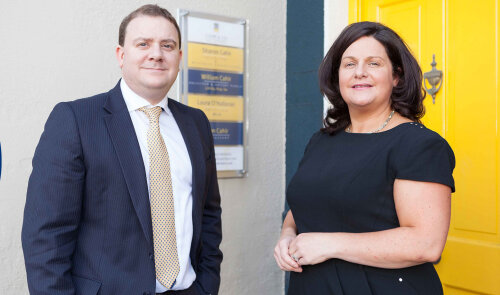Best Guardianship Lawyers in Ennis
Share your needs with us, get contacted by law firms.
Free. Takes 2 min.
List of the best lawyers in Ennis, Ireland
About Guardianship Law in Ennis, Ireland
Guardianship law in Ennis follows Irish family law and the national statutes that govern parental rights and responsibilities for children. Guardianship defines who has legal authority to make major decisions about a child's welfare, including education, medical treatment, and travel outside the State. The law aims to protect the best interests of the child as the primary consideration. Key national statutes that shape guardianship practice include the Guardianship of Infants Act and later reforms introduced by the Children and Family Relationships Act. In practice, guardianship matters that arise in Ennis are handled by local courts and by state agencies that provide child welfare services. Because the legal principles are set nationally, the application of the law in Ennis follows the same rules as elsewhere in Ireland, but practical steps - such as filing court forms or engaging local services - will be conducted through Ennis and County Clare offices and courts.
Why You May Need a Lawyer
Guardianship issues often involve emotional complexity and legal consequences that affect both children and adults for many years. You may need a lawyer in situations such as:
- Disputes between parents about who should be a guardian or who should make important decisions for a child.
- A single parent or other carer seeking a formal guardianship order to secure decision-making rights.
- A step-parent, relative, or other person seeking guardianship or facing opposition to a guardianship application.
- Conflicts about permission for medical treatment, schooling, or international travel where the consent of all guardians is in dispute.
- Interventions by statutory child protection services where allegations of risk to a child could lead to emergency court applications.
- Complex family situations including separation, divorce, donor-assisted conception, same-sex parenting arrangements, or where the child has a history with the child protection system.
A lawyer experienced in family law can advise on legal options, prepare and file court documents, represent you at hearings, explain your rights and likely outcomes, and help negotiate agreements or mediation sessions. Legal advice is especially important when cases are contested, when emergency orders are needed, or when long-term parenting arrangements are at stake.
Local Laws Overview
Although guardianship law is set by national legislation, these local aspects will be relevant to someone in Ennis:
- Courts and jurisdiction - Guardianship applications are typically made in the District Court or Circuit Court. Simple or urgent matters are usually heard in the District Court, while complex or high-value proceedings may go to higher courts. Ennis has local court sittings for County Clare matters; the correct venue will depend on the nature of the application.
- Child welfare agencies - The Child and Family Agency provides statutory child welfare and protection services across County Clare. Where welfare concerns exist or where court-ordered assessments are required, local agency involvement can be pivotal in guardianship cases.
- Legal aid and local solicitors - The Legal Aid Board and local solicitors in Ennis can assist with applications, subject to means and eligibility. There are solicitors practising family law in the Ennis area who can provide in-person consultations and representation.
- Mediation and dispute resolution - Local family mediation providers can be used to reach agreements on guardianship and related parenting issues. Courts often encourage or require mediation where appropriate.
- Practical matters - Local schools, medical services, and travel arrangements in and out of County Clare commonly rely on clear guardianship documentation. For example, schools and hospitals in Ennis will usually request proof of guardianship before permitting access to records or authorising significant decisions.
Frequently Asked Questions
What is guardianship and how does it differ from custody or access?
Guardianship is the legal authority to make major decisions about a child, such as health care, education, and residence. Custody refers to day-to-day care and where the child lives. Access or contact refers to visitation and relationships. A person can be a guardian without having primary custody, and custody arrangements do not automatically grant full guardianship rights.
Who is automatically a guardian in Ireland?
Mothers are automatically guardians of their children. Fathers who are married to the mother at the time of the child's birth are generally automatic guardians too. For unmarried fathers and other partners, guardianship may be acquired by agreement with the child's other guardian or by a court order. National law sets these rules, but situations vary and legal advice will clarify your position.
How do I apply to become a guardian in Ennis?
To apply for guardianship you generally submit an application to the appropriate court - often the District Court - in County Clare. The process usually involves preparing an affidavit or sworn statement, completing court forms, and serving notice on relevant parties. The court will consider the child's best interests and may request reports or hold a hearing before granting an order.
Can a guardian be removed or have their rights limited?
Yes. A court can remove or limit guardianship rights if it finds that continued guardianship is not in the child’s best interests. Reasons can include persistent inability to care for the child, risk of harm, or circumstances that make the guardian unfit. Removal is a serious legal step and will involve a court hearing and evidence.
Do step-parents or other relatives have a pathway to guardianship?
Yes. A step-parent or other relative can seek guardianship by agreement with the current guardians or by applying to the court. The court will assess the child's welfare and the nature of the relationship with the applicant before making any order. Agreements that are voluntary and well-documented are often easier to implement.
What happens if guardians disagree about medical treatment or travel abroad?
If guardians disagree on significant decisions like major medical treatment or abroad travel, the issue can be resolved by negotiation, mediation, or by applying to the court for directions. Courts generally decide based on the child's best interests. In urgent cases where a child is at immediate risk, emergency avenues exist to obtain temporary orders.
Will adoption affect guardianship?
Adoption normally removes the legal parental rights and responsibilities of the child’s existing parents or guardians and transfers them to the adoptive parents. If you are a guardian considering adoption matters, seek legal advice because adoption has permanent legal effects on guardianship and inheritance rights.
How long does a guardianship application take and how much will it cost?
Timescales vary. Uncontested applications might be resolved in weeks to months, while contested or complex cases can take longer. Costs depend on solicitor fees, whether expert reports are required, and whether the matter goes to a contested hearing. Legal aid may be available for qualifying applicants, and mediation is typically less costly than court litigation.
Will the Child and Family Agency be involved?
Possibly. The Child and Family Agency may become involved where there are concerns about a child’s welfare or when the court requests reports or assessments. The agency can provide social work reports, support services, and recommendations to the court. Their involvement does not automatically determine the outcome but can influence the court’s view on the child’s best interests.
What should I bring to my first meeting with a solicitor about guardianship?
Attend with key documents and information where possible - the child’s birth certificate, any existing court orders or documents, evidence of your relationship with the child (photos, school or medical records), correspondence with the child’s other guardians, identity documents, and any written concerns or reports. Prepare a clear timeline of events and a short summary of what you want the court to decide. This helps the solicitor give focused advice and estimate likely steps and costs.
Additional Resources
There are several organisations and public bodies that can provide information, assistance or formal services related to guardianship in Ennis and County Clare:
- The Child and Family Agency - statutory body responsible for child welfare and protection services and for providing reports to courts where necessary.
- The Legal Aid Board - administers means-tested civil legal aid for family law matters. Eligibility must be assessed.
- Local solicitors who specialise in family law - they can offer initial consultations, representation, and document preparation.
- The Courts Service - for information about local court sittings, fees, and how to file applications in the District or Circuit Court.
- Family mediation services - for alternative dispute resolution that can save time and expense in guardianship disputes.
- Local support organisations and community groups that offer practical help to families and children in County Clare.
Next Steps
If you believe you need legal assistance with a guardianship matter in Ennis, consider the following steps:
- Get an initial legal consultation - contact a solicitor who specialises in family law to discuss your situation, possible outcomes, required documents, and estimated costs.
- Check whether you qualify for legal aid - contact the Legal Aid Board to see if you meet the means and merits criteria for civil legal aid.
- Consider mediation - if the other party is willing, mediation can provide a quicker, less adversarial way to resolve guardianship issues.
- Gather documents and evidence - collect the child’s birth certificate, identification, school and medical records, proof of residence and any correspondence relevant to the dispute.
- If there is immediate risk to a child, contact emergency services or the Child and Family Agency and seek urgent legal advice about emergency court orders.
- If litigation is necessary, work with your solicitor to prepare and file the correct court application for guardianship in the appropriate Ennis or County Clare court and follow procedural directions from the court.
Taking informed, timely action and seeking specialist advice will help protect the child’s welfare and your legal position. Guardianship matters are sensitive and consequential - professional legal support and local statutory guidance can make a significant difference to the outcome.
Lawzana helps you find the best lawyers and law firms in Ennis through a curated and pre-screened list of qualified legal professionals. Our platform offers rankings and detailed profiles of attorneys and law firms, allowing you to compare based on practice areas, including Guardianship, experience, and client feedback.
Each profile includes a description of the firm's areas of practice, client reviews, team members and partners, year of establishment, spoken languages, office locations, contact information, social media presence, and any published articles or resources. Most firms on our platform speak English and are experienced in both local and international legal matters.
Get a quote from top-rated law firms in Ennis, Ireland — quickly, securely, and without unnecessary hassle.
Disclaimer:
The information provided on this page is for general informational purposes only and does not constitute legal advice. While we strive to ensure the accuracy and relevance of the content, legal information may change over time, and interpretations of the law can vary. You should always consult with a qualified legal professional for advice specific to your situation.
We disclaim all liability for actions taken or not taken based on the content of this page. If you believe any information is incorrect or outdated, please contact us, and we will review and update it where appropriate.









